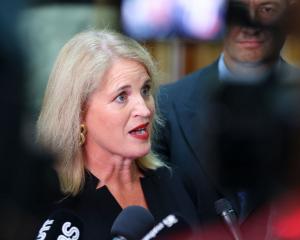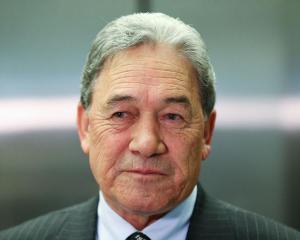
Venturing an opinion on this latest stage in Labour's campaign to "reconnect" with voters, the man told Mr Goff: "Listen mate.
You know we voted these guys in seven months ago.
You don't expect us to come up and say we did the wrong thing yet, do you?" There was only one thing wrong with that statement.
It is actually nine months since the election.
Otherwise, it cuts straight to the bone in supplying the reason why Labour is struggling for relevance.
The party simply doesn't have an audience beyond its core support base - yet.
No-one in Labour is willing to punt money on when "yet" will arrive.
Worryingly for the party, a poll out this week further confirmed the huge gap between Labour and its major rival, in this case a staggering 20 percentage points.
Arguably, the polls do not matter that much at this early stage of the three-year electoral cycle.
But with no end in sight to the golden weather being enjoyed by John Key and his Government, the pressure on Mr Goff to perform mounts accordingly.
Labour would like to believe it is in the same position National was in 2005 - a contender for power.
National's high poll ratings would suggest Labour is closer to the position National was following the 1999 election - staring down the barrel of at least two terms in Opposition.
As National discovered in 2000, an Opposition party can expend an awful lot of energy with very little result through constantly being eclipsed by a new government determined to pack as much as possible into its first 12 months back in office.
On becoming leader, Mr Goff was like a sprinter who has turned up for a long-distance race.
He seemed to treat every day as if election day was just around the corner.
He showed a frustration and impatience towards National still displayed by some of the shriller Labour-aligned blogs, which find fault with anything and everything the Key Government does while expecting their breathless critiques to somehow bring forward its demise.
It took a while for Mr Goff to work out that people were simply not listening to what he and Labour had to say.
A tactical shift has seen him being less in people's faces and more intent on quietly reminding them that Labour stands beside them.
He is now starting to pace himself and choose more carefully the issues on which he is planning to make the running.
Partly because the party is in Opposition, the atmosphere in the Labour caucus is said to be more relaxed than under the strict regime of Mr Goff's predecessor.
Mr Goff is said to run the caucus in a more collegial style and is more open to the free flow of opinion.
Just as well perhaps.
Labour's Red Alert blog, which has given the party's MPs a valuable mouthpiece, was up-and- running before Mr Goff was told of its establishment.
The re-emergence of more open debate within the party about ideas and policies was evident during the last couple of party conferences of the Clark dynasty.
The generational shift driving that is now manifested in the crop of new MPs, which is thought to be more talented than the 1990 intake which included the likes of Steve Maharey, Pete Hodgson and Lianne Dalziel.
The kind of revitalised thinking going on within the party was exhibited this week by a post on Red Alert from Rimutaka MP Chris Hipkins.
She noted the ongoing loss of traditional manufacturing and other blue-collar jobs in the Hutt Valley, with the displaced workers ending up in small businesses or becoming independent contractors.
Those people were now more worried about filling in their GST returns on time than they were in statutory meal breaks and personal grievance procedures.
She asked how Labour should respond to such changes in workforce demographics.
The answer is "differently" if it wishes to retain and build on its core constituency.
Ms Hipkins' observations are only the tip of an iceberg.
Labour is going to have to respond to a lot of things in a different fashion than it has done in the past.
Otherwise the party will be out of touch with mainstream opinion.
National is already trying to marginalise Labour, for example, by soft-selling much greater use of the private sector to deliver state-funded health, social and other services, plus infrastructure development to what it thinks is a public now more receptive to the proposition.
National has learnt to be more subtle in its advocacy, saying private sector involvement will only happen when it is "practical" or "sensible" or "workable" and - as Bill English was keen to stress this week - not for ideological reasons.
Labour's mindset is still back in the era when "privatisation" just meant selling large state assets - something National has anyway promised not to do in its first term.
As finance minister, Mr English was also busy rewriting economic history, saying it was now clear the economy started to get out of kilter around the end of 2003.
The obvious implication was this was Labour's fault and its ballooning public spending had only made things worse.
In chipping away at Labour's economic record, Mr English is seeking to undermine Labour's credibility on economic policy generally and public spending in particular.
The latter is especially relevant.
For the first time in a long time, a Labour caucus is going to have to write policy against the backdrop of Budget deficits for the foreseeable future.
So far, there is little indication of how Mr Goff is going to deal with these dilemmas while keeping faith with Labour's traditional constituency whose influence is bolstered by the new intake of MPs more inclined to the left.
While some policy matters such as climate change and emissions trading are said to be reasonably advanced, development of policy is generally only at the stage where spokespeople are producing broad discussion papers for wider caucus consideration.
Calls for policy alternatives will be ignored for quite a while yet.
Labour is instead responding to unpopular things National has done - such as cutbacks to adult night classes and the Auckland "Super City" proposal - by building coalitions of the like-minded in order to put more pressure on National to relent.
So far though there has been little indication of the direction Mr Goff's leadership is taking Labour.
That should become much more obvious at Labour's annual conference next month - the first full meeting of the party since the election defeat.
The conference should see Mr Goff really stamp his authority on the party. Whether he can reconnect with voters at the same time is a far bigger ask.
The pamphlet dropped into letter-boxes nationwide promoting Mr Goff listed two of the leader's attributes - a belief in hard work and inspiration.
Of the first commodity, there is no shortage on Mr Goff's part.
As for the second, we are still waiting.
- John Armstrong is The New Zealand Herald's political correspondent











